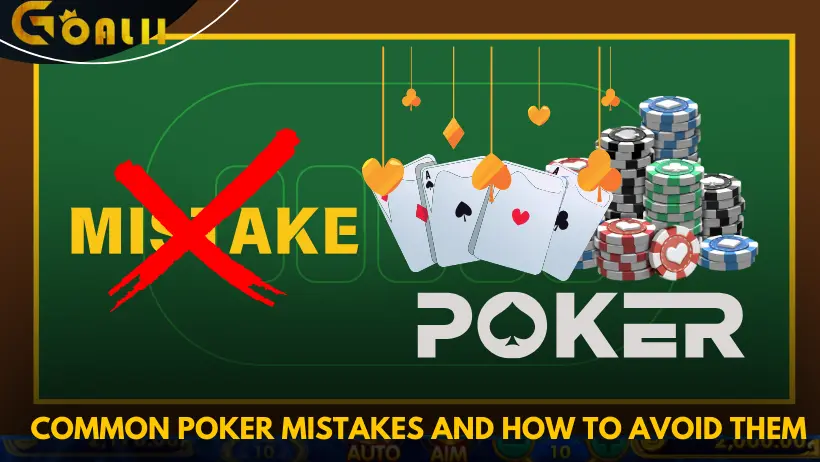Common Poker Mistakes and How to Avoid Them in this article. Poker is a complex game where even the smallest mistake can lead to significant losses. No matter how experienced you are, there’s always room for improvement. From casual players to serious contenders, everyone is prone to making certain missteps that affect their performance. Understanding and avoiding these common poker mistakes can greatly improve your results and put you on a path to becoming a better player with Goal11 Casino.
Here are players’ most common poker mistakes and how to avoid them.
1. Playing Too Many Hands

This is probably the biggest Poker Mistake in poker that most players, including novices, commit – playing too many hands. Such players may adopt a philosophy that requires much of them, to the extent of forcing them to play in almost every dealt hand in the game. It makes them go for pots with more really bad hands, knowing full well that such hands cannot win a pot.
How to Avoid the Playing Too Many Hands Mistake
Continue to play in a tighter-aggressive style, yet be more select than yesterday. Subsequently, aggressiveness should be aimed at the pre-flop to play only the really premium starting forms, especially in early positions. Be patient and disciplined. Winning isn’t about playing every hand there is; you just have to play the right hands.
Key Takeaway: One of the worst things that a poker player can do is to over-saturate himself with too many hands, and the key to success is quality not quantity.
2. Chasing Draws Too Often
Most players tend to make mistakes in going for draws that do not give them good pot odds. A player might be calling bets in an attempt to get a straight or even a flush, even if the possibility of making that draw is remote. Going for draws as a strategy can lead to dropping a lot of chips after some time.
How to Avoid The Chasing Draws Too Often Poker Mistake
Understand what pot odds and implied odds are all about. If the pot isn’t large enough that it deserves a call, you are likely to be better off folding it. Always remember the odds of your making your draw and then compare this with the amount that you need to call.
Key Takeaway: Only continue withdraws if you think you will have enough to cover the pot or do not care if you do not get them. If not, then just fold.
3. Failing to Pay Attention to Table Position
Another consideration with every hand is your position at the poker table. Those who pay attention to a position usually make wise choices now and then. For example, they may use weak hands during early positions or be too passive during late positions.
How to Avoid the Failing to Pay Attention to Table Position Mistake.
Always establish a position as one of the criteria for decision making considerations. Adjust the range of the game from early positions and play much more loose from the later positions. Make better bets and raises and gain the power to feed off your opponents and know their strategies.
Key Takeaway: In all circumstances, you must always analyze the relative position of the dealer before you take action.
4. Playing Emotionally (On Tilt)
The measure of ‘going on tilt’ means playing an emotional downside, ordinarily due to frustration or anger after a rotten beat. When players are on tilt, emotions take control over their decisions. For instance, they can continue to play in an attempt to win back their losses or make stupid plays that make their losses bigger.

How to Avoid The Playing Emotionally Mistake
Start taking breaks when your emotion seems to get the upper hand in the situation. Understand the signs of tilt and avoid getting to a point where your emotions are all over your decision-making. Being free of any emotional perturbation is something that may prove beneficial in the long run as far as poker is concerned.
Key Takeaway: Be rational, and do not let your name-calling and anger control you. However, if distracted or stressed, momentarily pause before continuing.
5. Mismanaging Your Bankroll
Several gamers are caught up in the common Poker mistake of poor money management, meaning they play beyond their means or don’t set enough cash aside to deal with losses. Still, the bad consequences may sap the bankroll and make it possible to go broke very fast.
How to Avoid
One of the most important rules of poker for beginners is to adopt a strict poker bankroll management strategy. Always gamble at stakes that are within your budget or capability to lose – your money and no one else’s. A golden rule when it comes to staking is that you should have 20-30 buy-ins for the stakes in question. Always approach a gambling table with an amount you are willing to surrender without regret.
Key Takeaway: The most important thing to remember in any gambling game is to try to maintain a good bankroll that can sustain you as long as you can stay playing the game without having to worry about financial problems.
6. Overvaluing Marginal Hands
A major blunder that many players make is to overestimate or overshoot the nuts when they have cards that appear strong or sound good, though, in fact, they are far from it. Heads like top pairs with weak kickers or medium pocket pairs can be easily dominated, and hence, they turn out to be costly if they are overplayed.
How to Avoid Overvaluing Marginal Hands Poker Mistake
Recognize the strength of your hand in relation to the board and your opponent’s actions. Be cautious with hands that are easily beaten, and don’t be afraid to fold if the situation calls for it.
Key Takeaway: Don’t overcommit to hands that aren’t likely to be winners, especially when facing significant aggression from your opponents.
7. Failing to Adapt to Opponents
As with any game, poker is about change. If you are not observant of how your opponents play the game and how you can manipulate that to your advantage, then you are missing out on their chips. Some do not study their opponents to find tendencies or patterns that the betters normally exhibit, hence easily exploitable.
How to Avoid Failing to Adapt to Opponents
Track the behavior of your rivals and base your activities on a study of their behavior patterns. For instance, if your opponent has been laying low, there is an option to pump up the aggression. The fact is that if a player goes on with the aggression he is capable of, you can entrap him with real strong hands.
Key Takeaway: Always be informed of how your opponents are playing and try to design strategies in relation to their play.
8. Ignoring Pot Odds
Knowledge of pot odds is essential for playing poker. Since pot odds define the likelihood of winning on a certain type of hand, using the pot odds with the number of outs explains the player’s chances of winning the hand. It is common for many players, especially novices, to pay no attention to pot odds when they make calls or raises, regardless of the fact that they do not make sense. Such an error can result in avoidable losses.
How to Avoid Ignoring Pot Odds
When deciding to make a call or not, consider whether a potential win is worth the shot (the size of the pot) in relation to the amount of money to call. Suppose the pot odds are unfavorable; stay out of the pot.
Key Takeaway: Pot odds must always be calculated before making a call in order to guarantee that the decision being made is accurate.
9. Bluffing Too Much or Too Little
Bluffing is an important element of poker, but a large amount of people bluff too often or not enough. Overblowing the bluff makes you predictable and easy for the opponent to handle, whereas when you underbluff, you are missing out on probably trying to snatch pots without revealing your cards.

How to Avoid Bluffing Too Much or Too Little
Do not bluff often, and do not bluff carelessly. You have to employ your bluffs in a manner that will make them sound like a coherent story, and you have to rely on the board and what your opponents are doing. Do not bluff merely to bluff, but use the bluff in proportion to the frequency of value bets.
Key Takeaway: Bluff to an extent, and only partially depends on it as a strategy. You can use Common Poker Mistakes and How to Avoid Them as a strategy to have your opponents constantly on their back foot.
=> View more: Top 6 Poker Strategies Every Player Should Know
Conclusion
Poker is a game where strategy and skill come into play, and one has to learn all the time. The article Common Poker Mistakes and How to Avoid Them is easy to understand keeping clear of these Poker Mistakes will enable you to enhance your game massively and enhance your odds of success. This means doing it only when necessary, controlling the money you use properly, and always adjusting to the current conditions. Poker is one game that you never get to finish learning, no matter how often you play it or how well you play it with Poker Mistakes.
Self management and correction of Poker Mistakes are the main factors that will help you win in the long run when playing poker at Goal. Play now!
Play now!

